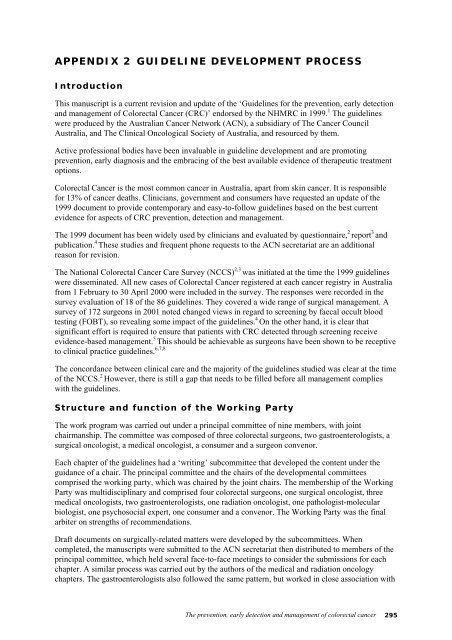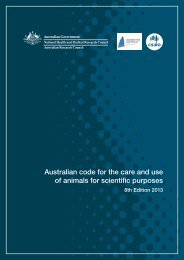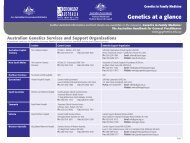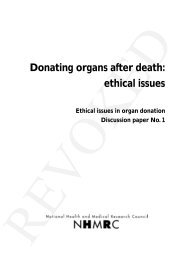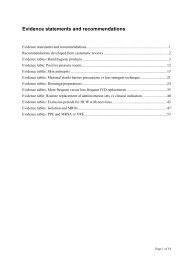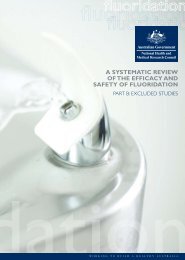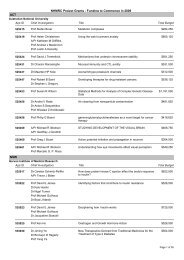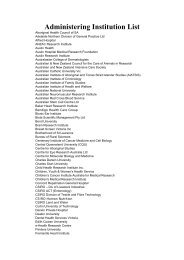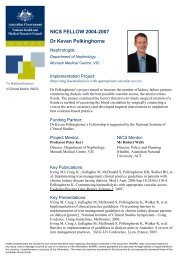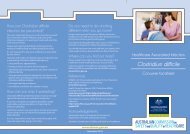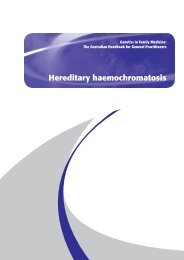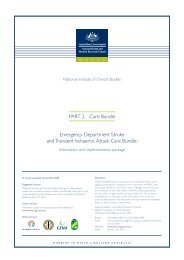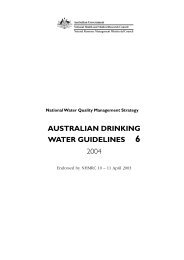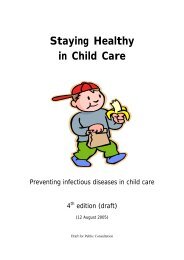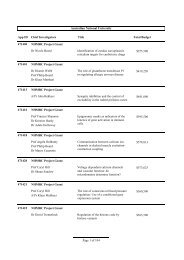Clinical Practice Guidelines - National Health and Medical Research ...
Clinical Practice Guidelines - National Health and Medical Research ...
Clinical Practice Guidelines - National Health and Medical Research ...
You also want an ePaper? Increase the reach of your titles
YUMPU automatically turns print PDFs into web optimized ePapers that Google loves.
APPENDIX 2 GUIDELINE DEVELOPMENT PROCESS<br />
Introduction<br />
This manuscript is a current revision <strong>and</strong> update of the ‘<strong>Guidelines</strong> for the prevention, early detection<br />
<strong>and</strong> management of Colorectal Cancer (CRC)’ endorsed by the NHMRC in 1999. 1 The guidelines<br />
were produced by the Australian Cancer Network (ACN), a subsidiary of The Cancer Council<br />
Australia, <strong>and</strong> The <strong>Clinical</strong> Oncological Society of Australia, <strong>and</strong> resourced by them.<br />
Active professional bodies have been invaluable in guideline development <strong>and</strong> are promoting<br />
prevention, early diagnosis <strong>and</strong> the embracing of the best available evidence of therapeutic treatment<br />
options.<br />
Colorectal Cancer is the most common cancer in Australia, apart from skin cancer. It is responsible<br />
for 13% of cancer deaths. Clinicians, government <strong>and</strong> consumers have requested an update of the<br />
1999 document to provide contemporary <strong>and</strong> easy-to-follow guidelines based on the best current<br />
evidence for aspects of CRC prevention, detection <strong>and</strong> management.<br />
The 1999 document has been widely used by clinicians <strong>and</strong> evaluated by questionnaire, 2<br />
report 3<br />
<strong>and</strong><br />
publication. 4<br />
These studies <strong>and</strong> frequent phone requests to the ACN secretariat are an additional<br />
reason for revision.<br />
The <strong>National</strong> Colorectal Cancer Care Survey (NCCS) 2,3 was initiated at the time the 1999 guidelines<br />
were disseminated. All new cases of Colorectal Cancer registered at each cancer registry in Australia<br />
from 1 February to 30 April 2000 were included in the survey. The responses were recorded in the<br />
survey evaluation of 18 of the 86 guidelines. They covered a wide range of surgical management. A<br />
survey of 172 surgeons in 2001 noted changed views in regard to screening by faecal occult blood<br />
testing (FOBT), so revealing some impact of the guidelines. 4 On the other h<strong>and</strong>, it is clear that<br />
significant effort is required to ensure that patients with CRC detected through screening receive<br />
evidence-based management. 5 This should be achievable as surgeons have been shown to be receptive<br />
to clinical practice guidelines. 6,7,8<br />
The concordance between clinical care <strong>and</strong> the majority of the guidelines studied was clear at the time<br />
of the NCCS. 2 However, there is still a gap that needs to be filled before all management complies<br />
with the guidelines.<br />
Structure <strong>and</strong> function of the Working Party<br />
The work program was carried out under a principal committee of nine members, with joint<br />
chairmanship. The committee was composed of three colorectal surgeons, two gastroenterologists, a<br />
surgical oncologist, a medical oncologist, a consumer <strong>and</strong> a surgeon convenor.<br />
Each chapter of the guidelines had a ‘writing’ subcommittee that developed the content under the<br />
guidance of a chair. The principal committee <strong>and</strong> the chairs of the developmental committees<br />
comprised the working party, which was chaired by the joint chairs. The membership of the Working<br />
Party was multidisciplinary <strong>and</strong> comprised four colorectal surgeons, one surgical oncologist, three<br />
medical oncologists, two gastroenterologists, one radiation oncologist, one pathologist-molecular<br />
biologist, one psychosocial expert, one consumer <strong>and</strong> a convenor. The Working Party was the final<br />
arbiter on strengths of recommendations.<br />
Draft documents on surgically-related matters were developed by the subcommittees. When<br />
completed, the manuscripts were submitted to the ACN secretariat then distributed to members of the<br />
principal committee, which held several face-to-face meetings to consider the submissions for each<br />
chapter. A similar process was carried out by the authors of the medical <strong>and</strong> radiation oncology<br />
chapters. The gastroenterologists also followed the same pattern, but worked in close association with<br />
The prevention, early detection <strong>and</strong> management of colorectal cancer<br />
295


